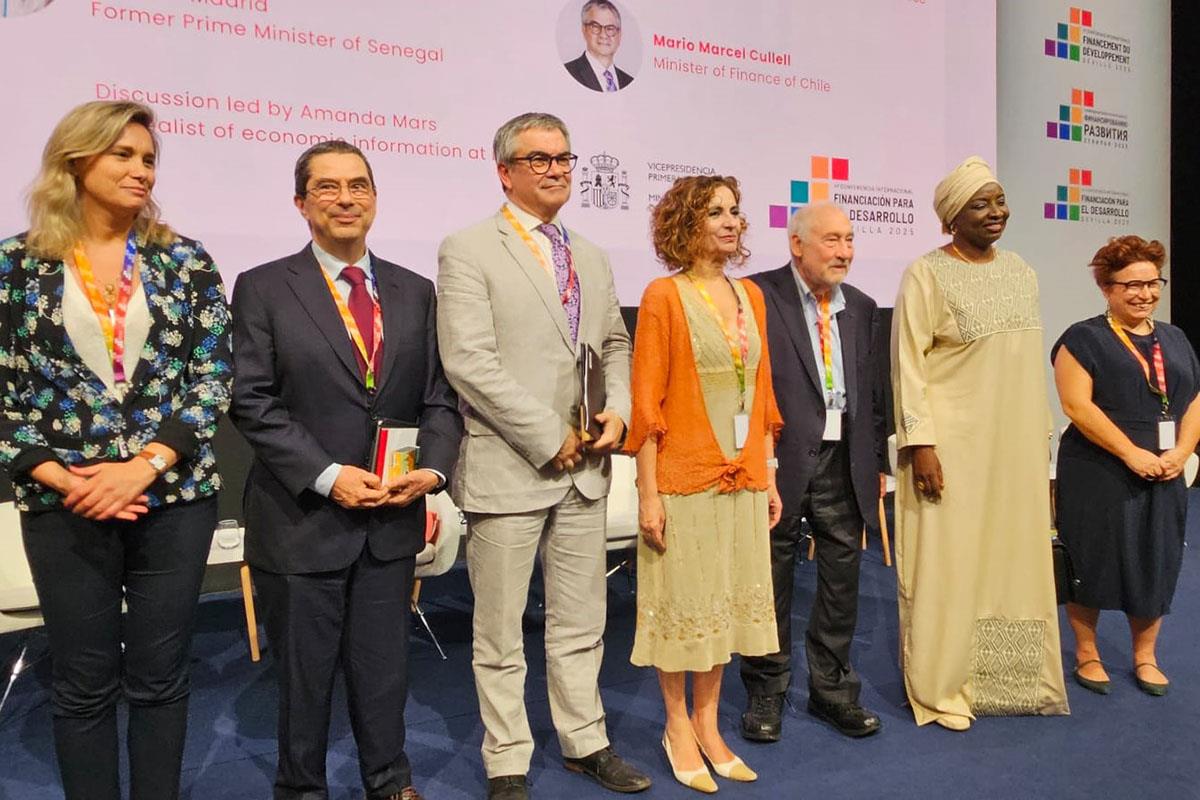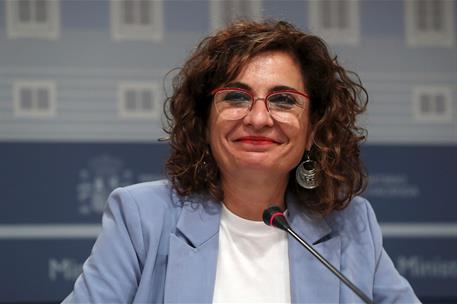Montero argues that tax systems around the world should be progressive to help fight inequality
News - 2025.7.3
 The First Vice-President of the Government of Spain and Minister for Treasury, María Jesús Montero, at the finance event held at the Seville Conference
The First Vice-President of the Government of Spain and Minister for Treasury, María Jesús Montero, at the finance event held at the Seville Conference
Montero delivered this defence of progressiveness and tax justice at a Special Event of the Treasury held within the framework of the 4th United Nations International Conference on Financing for Development, which is being held in Seville.
She discussed these issues with leading experts in the field of taxation, such as Nobel Prize winner and head of the Independent Commission on International Corporate Tax Reform (ICRICT), Joseph Stiglitz; the Chilean Minister of Finance, Mario Marcel Cullell; the former Prime Minister of Senegal, Aminata Touré; the Director of the IMF's Fiscal Affairs Department, Vítor Gaspar; and the Global Director of Tax Justice at Oxfam International, Susana Ruiz.
In her opening speech at the Special Event, Montero advocated "fair and inclusive development of countries" and "the reduction of inequality" through taxation. As the First Vice-President explained, the way to achieve fairer societies is through taxes, which provide "a social safety net for citizens, guaranteeing their welfare and security and equal opportunities", whatever the country.
A model that she contrasted with the model of a reduced tax burden, which leads to "a weakening of the capacity of states to redistribute wealth or the possibility of financing public services". This makes it difficult for citizens to access a social safety net because of this idea of promoting massive tax cuts which supposedly stimulates economic activity or investment.
"The fiscal vision defines very well the model of society to which each person legitimately aspires," said Montero. On this basis, the Minister for Treasury stressed that the societies of more egalitarian countries "grow in a more sustained and stable manner than those that are not", according to studies by prestigious international organisations.
"We have numerous pieces of evidence that show that more egalitarian societies have better indicators of democratic satisfaction, fewer mental or physical health problems and less public insecurity," she insisted, stressing Spain's predisposition towards these situations that foster inequality. "You can always count on Spain in this spirit of collaboration and shared work in the interests of fairer and more progressive taxation", she added.
More money in fewer hands
Recalling one of the quotes by the French economist Thomas Piketty, Montero put on the table that "inequality is essentially a political decision". For this reason, she regretted that in recent years there has been "a significant increase and concentration of wealth in the hands of very few people or companies". According to the data presented by the First Vice-President, the world's richest 1% currently control 95% of the world's wealth.
In order to combat this, she recalled the joint commitment of the governments of Spain and Brazil to promote a global initiative to achieve greater taxation of the super-rich. A proposal that is linked to the fulfilment of the UN Sustainable Development Goals (SDGs). The fight against growing extreme inequality and achieving a greater redistribution of wealth through progressive tax systems are the foundations of this Spanish-Brazilian project.
"It is unacceptable that these high net worth individuals often enjoy significantly lower effective tax rates than the average worker or citizen", reiterated the head of the Treasury, in response to which she called for a "political commitment" to a challenge that she put on a par with the climate emergency, the digital transition and migratory flows.
International collaboration for progressiveness
Following her presentation, María Jesús Montero called on countries, international organisations, academics and civil society to start a debate on ways to guarantee the progressiveness and efficiency of tax systems at a global level.
This proposal was taken up by the rapporteurs in their speeches. For Nobel laureate Joseph Stiglitz, the key to the debate is not to put the rich ahead of the rest of society. Something that, he denounces, is happening in the United States, "with an agenda of lowering taxes for the richest while making cuts in health care for the poor". This "will ultimately impact on inequality around the world".
According to Chile's finance minister, one of the problems facing tax administrations around the world is "the ability and resources of the wealthiest to evade taxes". He therefore considered that states should have "the capacity to anticipate evasion". This is in line with what the former prime minister of Senegal denounced about multinationals working in Africa. "They do not pay taxes in our countries despite extracting our raw materials. That has to change," said Aminata Touré.
For the IMF representative, another issue to be taken into account is countries where there is little tax collection capacity due to the design of their taxation systems. According to Vítor Gaspar, "this impedes further development and their competitiveness, with impacts of up to 15% of GDP. The Oxfam International representative welcomed the Spain-Brazil initiative in the face of the super-rich, because "we should not always wait for ideal conditions for a consensus". And that even in the current circumstances "192 countries support this UN summit".
Entering the panel discussion, María Jesús Montero reiterated that the aim is to fight inequality. This can be achieved through this kind of international cooperation, which would help with "compiling information on the concentration of wealth and effective tax rates". In addition to this we could add support for "comparative research that will enable us to arrive at the best possible diagnosis and solution".
Spain has already played a key role in this initiative. In addition to the agreement with Brazil for higher taxation of the super-rich, Pedro Sánchez's government has been one of those at the forefront of international tax cooperation. In pursuit of the goal of building a fairer tax world, Spain has been pushing the debate on this issue for several years. This has taken the form of the 15% minimum tax on multinationals or the Tax on Certain Digital Services.
Non official translation





